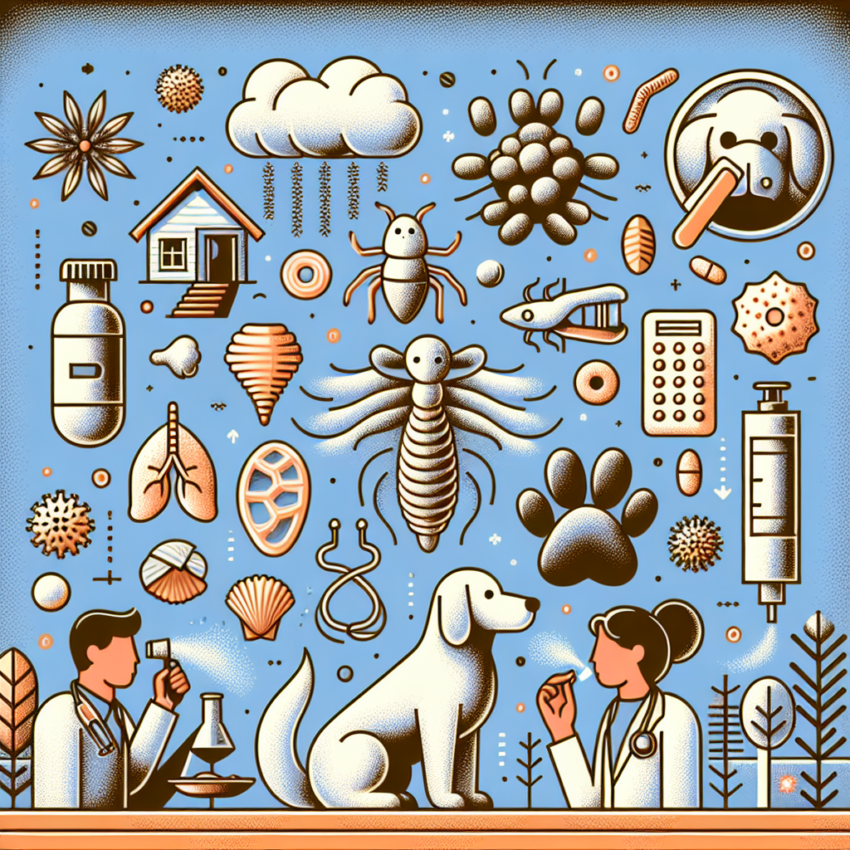Understanding Allergies: Triggers And Treatment Options

Allergies can be a nuisance, causing discomfort and unwanted symptoms. But fear not, because in this article, we will help you gain a better understanding of allergies, their triggers, and the array of treatment options available to alleviate your symptoms. From pollen to pet dander, we will explore the common allergens that can trigger allergic reactions. Additionally, we will delve into the various treatment options, including medication, lifestyle changes, and alternative therapies, to help you find relief from the pesky symptoms associated with allergies. So sit back, relax, and let’s embark on this journey to better understand allergies and how to manage them effectively.

Common Types of Allergies
Hay Fever (Allergic Rhinitis)
Hay fever, also known as allergic rhinitis, is a common type of allergy that occurs when your immune system overreacts to allergens in the air, such as pollen, dust mites, or pet dander. Symptoms of hay fever include sneezing, itching, a runny or stuffy nose, and watery eyes. While hay fever is often associated with springtime allergies, it can occur year-round, depending on the allergen.
Asthma
Asthma is a chronic respiratory condition that is often triggered by allergies. People with asthma have inflamed airways that can become narrowed or blocked, leading to difficulty breathing, wheezing, coughing, and chest tightness. Allergens such as pollen, dust mites, pet dander, or mold spores can trigger asthma symptoms in sensitive individuals.
Food Allergies
Food allergies occur when your immune system reacts to specific proteins in certain foods, treating them as harmful substances. Common allergenic foods include peanuts, tree nuts, milk, eggs, wheat, soy, fish, and shellfish. Symptoms can range from mild, such as hives or an itchy mouth, to severe, with the possibility of life-threatening anaphylaxis.
Insect Sting Allergies
Insect sting allergies are triggered by the venom injected into the skin when stung by bees, wasps, hornets, or fire ants. For most people, a sting may cause temporary pain, swelling, and redness, but for others with a sting allergy, it can lead to a severe allergic reaction. Symptoms can include itching, hives, difficulty breathing, and in rare cases, anaphylaxis.
Drug Allergies
Drug allergies occur when your immune system reacts to certain medications. Common culprits include antibiotics (such as penicillin), anti-inflammatory drugs (such as ibuprofen), and chemotherapy medications. Symptoms can vary, ranging from mild skin rashes and itching to severe reactions, including anaphylaxis. It’s important to inform your healthcare provider about any known drug allergies to avoid potentially harmful reactions.
Contact Dermatitis
Contact dermatitis is a type of allergy that occurs when your skin comes into contact with a substance that triggers an immune response. Common irritants include certain metals (like nickel), latex, fragrances, and chemicals in skincare products. Symptoms can range from redness, itching, and rash to blistering or swelling. Identifying and avoiding the triggers is crucial for managing contact dermatitis.
Identifying Allergy Triggers
Environmental Allergens
Environmental allergens are substances found in the environment that can trigger allergic reactions. These include pollen, mold spores, dust mites, pet dander, and certain indoor and outdoor pollutants. Identifying the specific allergens that affect you can help you take necessary steps to minimize exposure and manage your symptoms effectively.
Food Allergens
Food allergens are proteins in specific foods that can cause allergic reactions. Common food allergens include peanuts, tree nuts, milk, eggs, wheat, soy, fish, and shellfish. Keeping a food diary and working with a healthcare professional can help identify the specific allergens and develop an appropriate dietary plan to avoid potential reactions.
Insect Sting Allergens
Insect sting allergens are the venom injected into the skin by stinging insects such as bees, wasps, hornets, or fire ants. Identifying the specific insect venom that triggers an allergic reaction is crucial as it helps determine the appropriate treatment and preventive measures, such as avoiding known areas with stinging insects or carrying an epinephrine auto-injector.
Medication Allergens
Medication allergens are certain medications that can trigger allergic reactions in susceptible individuals. These can include antibiotics, nonsteroidal anti-inflammatory drugs (NSAIDs), anesthetics, and chemotherapy drugs. Keeping a record of known medication allergies and informing healthcare providers is essential to avoid adverse reactions.
Contact Allergens
Contact allergens are substances that come into contact with the skin and trigger allergic reactions. These can include metals (like nickel), latex, fragrances, preservatives, and chemicals in personal care products, household cleaners, or even jewelry. Identifying and eliminating contact with these allergens is important for preventing recurring skin reactions.
Symptoms of Allergic Reactions
Respiratory Symptoms
Allergies can cause various respiratory symptoms, including sneezing, runny or congested nose, itching or irritation in the nose or throat, and frequent episodes of coughing. In some cases, allergies can also trigger or worsen asthma, leading to wheezing, shortness of breath, and chest tightness.
Skin Symptoms
Skin symptoms are common in allergies and can include itching, redness, hives (raised, itchy bumps on the skin), eczema (inflamed, itchy patches), swelling, or a rash. Contact with an allergen or exposure to certain foods can cause immediate allergic reactions on the skin.
Gastrointestinal Symptoms
Allergies, particularly food allergies, can manifest as various gastrointestinal symptoms. These may include nausea, vomiting, stomach cramps, diarrhea, or even more severe symptoms like abdominal pain and bloating. Identifying the specific food allergen that triggers these symptoms is crucial for managing and avoiding potential reactions.
Anaphylaxis
Anaphylaxis is a severe and potentially life-threatening allergic reaction that affects multiple systems in the body. Symptoms can include difficulty breathing, swelling of the face or throat, rapid heartbeat, dizziness, confusion, and a drop in blood pressure. Anaphylaxis requires immediate medical attention and often requires the use of an epinephrine auto-injector.
Diagnosing Allergies
Medical History and Physical Examination
Diagnosing allergies typically begins with a thorough medical history and physical examination. Your healthcare provider will ask about your symptoms, triggers, and any family history of allergies. They will also examine your nose, throat, and skin for signs of allergic reactions.
Allergy Tests
Allergy tests are often used to identify specific allergens that trigger your symptoms. These tests can include skin prick tests, blood tests (such as allergen-specific immunoglobulin E or IgE testing), or patch tests for contact dermatitis. These tests help identify the allergens you are sensitive to and guide further treatment and avoidance strategies.
Elimination Diet
For diagnosing food allergies, an elimination diet may be recommended. This involves eliminating suspected food allergens from your diet and then gradually reintroducing them while monitoring for any allergic reactions. Working with a healthcare professional or allergist is crucial during this process to ensure accurate identification of food allergens.
Challenge Tests
Challenge tests involve the supervised introduction of an allergen to confirm or rule out an allergy. These tests are typically performed in a controlled healthcare setting, such as a hospital or clinic, to monitor your body’s response to the allergen. Challenge tests are especially useful in diagnosing drug or insect sting allergies.

Managing Allergies
Avoidance Techniques
Avoiding known allergens is the primary approach to managing allergies. This can involve strategies such as minimizing exposure to environmental allergens (closing windows during high pollen seasons, using air purifiers), reading food labels to avoid allergenic ingredients, and taking precautions to avoid insect stings (such as wearing protective clothing or using insect repellents).
Medications
Various medications can help manage allergy symptoms. Antihistamines can provide relief from sneezing, itching, and runny nose. Decongestants can help reduce nasal congestion. Corticosteroids can be used for more severe or persistent symptoms. Mast cell stabilizers, leukotriene modifiers, and immunomodulators are other medication options that target specific allergy triggers or immune responses.
Immunotherapy
Immunotherapy, also known as allergy shots, is a long-term treatment option for allergies. It involves receiving regular injections of gradually increasing doses of allergens to help your body build tolerance. Immunotherapy can be effective for environmental allergies, insect sting allergies, and certain cases of asthma or food allergies.
Emergency Plan
For individuals with severe allergies or a history of anaphylaxis, having an emergency plan is crucial. This plan should include carrying an epinephrine auto-injector, informing close contacts about your allergies, and knowing when and how to use the auto-injector. Seeking immediate medical help after using the auto-injector is necessary to ensure proper management of anaphylaxis.
Preventive Measures
Maintaining Clean Indoor Air
Improving indoor air quality is essential for minimizing exposure to environmental allergens. This can involve regular vacuuming and dusting, using high-efficiency air filters, keeping windows closed during peak pollen seasons, and reducing humidity levels to deter mold growth.
Avoiding Allergenic Foods
If you have food allergies, it is important to diligently avoid allergenic foods to prevent reactions. This can involve reading food labels carefully, communicating your allergies to food service providers, and preparing meals at home using safe ingredients. Proper education and awareness about cross-contamination are essential in avoiding accidental exposures.
Insect Sting Prevention
To prevent insect sting allergies, it is crucial to take precautions when spending time outdoors. This can include wearing long-sleeved clothing, using insect repellents, avoiding wearing bright colors or perfumes that attract insects, and being cautious around areas known to harbor stinging insects.
Check Medication Ingredients
For individuals with known medication allergies, it is important to carefully read the ingredients of any prescribed or over-the-counter medications. Communicating your allergies to healthcare providers and pharmacists can help prevent accidental exposures and minimize the risk of adverse reactions.
Skin Protection
To prevent contact dermatitis, it is important to protect your skin from irritants or allergens. This can involve wearing gloves when handling chemicals, using non-irritating skincare products, avoiding contact with known triggers, and practicing good hygiene to keep the skin clean.
Allergy Medications
Antihistamines
Antihistamines are medications commonly used to relieve allergy symptoms, such as sneezing, itching, and runny nose. They work by blocking the effects of histamine, a chemical released during an allergic reaction.
Decongestants
Decongestants help reduce nasal congestion caused by allergies. They work by narrowing blood vessels in the nasal passages, thereby reducing swelling and improving airflow.
Corticosteroids
Corticosteroids, available in nasal sprays, inhalers, and creams, are potent anti-inflammatory medications that can relieve symptoms of allergies, such as nasal congestion, swelling, and itching. They are often used for more severe or persistent symptoms.
Mast Cell Stabilizers
Mast cell stabilizers help prevent the release of histamine and other chemicals that trigger allergic reactions. They are available as nasal sprays or eye drops and can be effective in managing allergy symptoms in the long term.
Leukotriene Modifiers
Leukotriene modifiers are medications that target specific chemicals involved in the allergic response. They can help manage allergies and asthma by reducing inflammation and muscle constriction in the airways.
Immunomodulators
Immunomodulators, such as omalizumab, are medications that modify the immune system’s response to allergens. They can be used for severe asthma or allergic reactions that do not respond well to other medications.
Epinephrine Auto-Injectors
Epinephrine auto-injectors are lifesaving devices that deliver a dose of epinephrine, a hormone that counteracts severe allergic reactions. They are used in emergencies to treat anaphylaxis and should be carried by individuals with a history of severe allergies.
Immunotherapy
Allergy Shots
Allergy shots, also known as subcutaneous immunotherapy, involve receiving regular injections of allergen extracts to help your body build tolerance. They are commonly used for environmental allergens, such as pollen or dust mite allergies, and can be effective in reducing the severity of symptoms over time.
Sublingual Immunotherapy
Sublingual immunotherapy involves placing allergen extracts under the tongue, allowing them to be absorbed into the bloodstream. It is an alternative to allergy shots for certain allergens and can be administered at home after an initial evaluation by a healthcare professional.
Emergency Allergy Treatment
Epinephrine Administration
In the case of an anaphylactic reaction, prompt administration of epinephrine is crucial. Epinephrine helps reverse the severe symptoms of anaphylaxis, including difficulty breathing, swelling, and a drop in blood pressure. An epinephrine auto-injector should be used immediately when experiencing symptoms and followed by seeking immediate medical help.
Seeking Immediate Medical Help
In case of severe allergic reactions, such as anaphylaxis, it is important to seek immediate medical help. Anaphylaxis is a medical emergency that requires professional medical treatment and monitoring. Even if the symptoms improve after using an epinephrine auto-injector, medical help should still be sought to ensure proper management and prevention of further complications.
Alternative Treatments
Probiotics
Probiotics are live bacteria and yeasts that are beneficial for gut health. Some studies suggest that certain strains of probiotics may help modulate the immune system and potentially reduce the risk or severity of allergies. However, more research is needed to fully understand their role in allergy management.
Acupuncture
Acupuncture is an alternative therapy that involves inserting thin needles at specific points on the body. Some studies suggest that acupuncture may help alleviate allergy symptoms, although its effectiveness can vary among individuals. Consulting with a licensed acupuncturist is recommended for those considering acupuncture as a complementary approach.
Herbal Remedies
Certain herbal remedies, such as butterbur or stinging nettle, have been traditionally used for allergy relief. However, the efficacy and safety of herbal remedies can vary, and it is important to consult with a healthcare professional before using any herbal supplements or remedies.
In conclusion, understanding allergies, their triggers, and available treatment options is essential for effectively managing and preventing allergic reactions. Identifying allergens through medical history, physical examination, and allergy tests helps guide avoidance strategies and appropriate treatment plans. Medications, immunotherapy, and emergency preparedness play important roles in managing allergies, while preventive measures, such as maintaining clean indoor air and avoiding allergenic foods or insects, are key in reducing exposure to allergens. Alternative treatments, such as probiotics, acupuncture, or herbal remedies, may provide additional support but should be approached with caution and under the guidance of healthcare professionals. With proper management and awareness, individuals with allergies can live healthier and more comfortable lives.



Leave a Reply